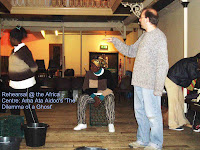 That would be me. As well as 20 other writers across the Commonwealth, that is. I got a Highly Commended Award in the 2007 Commonwealth Short Story Competition for my short story, "Trial by Water".
That would be me. As well as 20 other writers across the Commonwealth, that is. I got a Highly Commended Award in the 2007 Commonwealth Short Story Competition for my short story, "Trial by Water". My thanks to readers who have left congratulatory messages for me on several Wordsbody posts over the last week...
The big news of course is that of the competition's overall winner, Zambian Ellen Banda-Aaku, who cleaned the board for her short story, (read Sozi's Box). You can also listen to Sozi's Box online. This also makes Ms Banda-Aaku the Regional winner for Africa. She received her £2000 prize from none other than Terry Waite on Wednesday 21 November in a ceremony held at Makerere University in Kampala, Uganda. "Winning the competition means a lot to me," Ellen Banda-Aaku reportedly said. "I hope my win inspires other African writers, to enter the competition."
There are 2 other 'Highly Commended writers from Africa - Wame Molefhe of Botwana for her story, "Six Pack" & South African Linda C Saunders for "Never Put Your Hands in a Dog's Mouth" [good advice!].
The competition is administered by the Commonwealth Broadcasting Association and has been running annually since 1996.
This year's judges were: writer Donna Daley-Clarke, writer and broadcaster Lucy Hannah, and Nathan Hamilton of the New Writing Partnership.
Hamilton said of the 2007 competition, "In general, the issues that cropped up most often were to do with terrorism or war; childhood; cultural tensions in the family across generations and racial boundaries; emigration and immigration. Environmental concerns were also prevalent. And sometimes entries seemed too preoccupied with portraying elements that may have been assumed to be what a judging panel in London wanted to read. However, each of the winners went beyond a self-consciously chosen issue or theme. They listened instead to the needs of the story and let that guide them."
The 26 winning stories were selected from over 2000 entries. All 26 have been professionally recorded on CD and will be broadcast on radio all over the Commonwealth.
.jpg)










.jpg)
.jpg)
.jpg)






.jpg)
.jpg)
.jpg)
.jpg)
.jpg)
.jpg)
 It’s ANA’s Conference season (the 26th annual convention is on in Owerri, Nigeria, this weekend) presided over by the ANA President Wale Okediran. What better time to recall some of the ways in which Okediran represents the Nigerian writers’ body on trips to Britain?
It’s ANA’s Conference season (the 26th annual convention is on in Owerri, Nigeria, this weekend) presided over by the ANA President Wale Okediran. What better time to recall some of the ways in which Okediran represents the Nigerian writers’ body on trips to Britain? .jpg)
.jpg)
.jpg)
.jpg)
.jpg)
.jpg)
.jpg)
.jpg)
.jpg)
.jpg)
.jpg)
.jpg)
.jpg)
.jpg)










.jpg)




